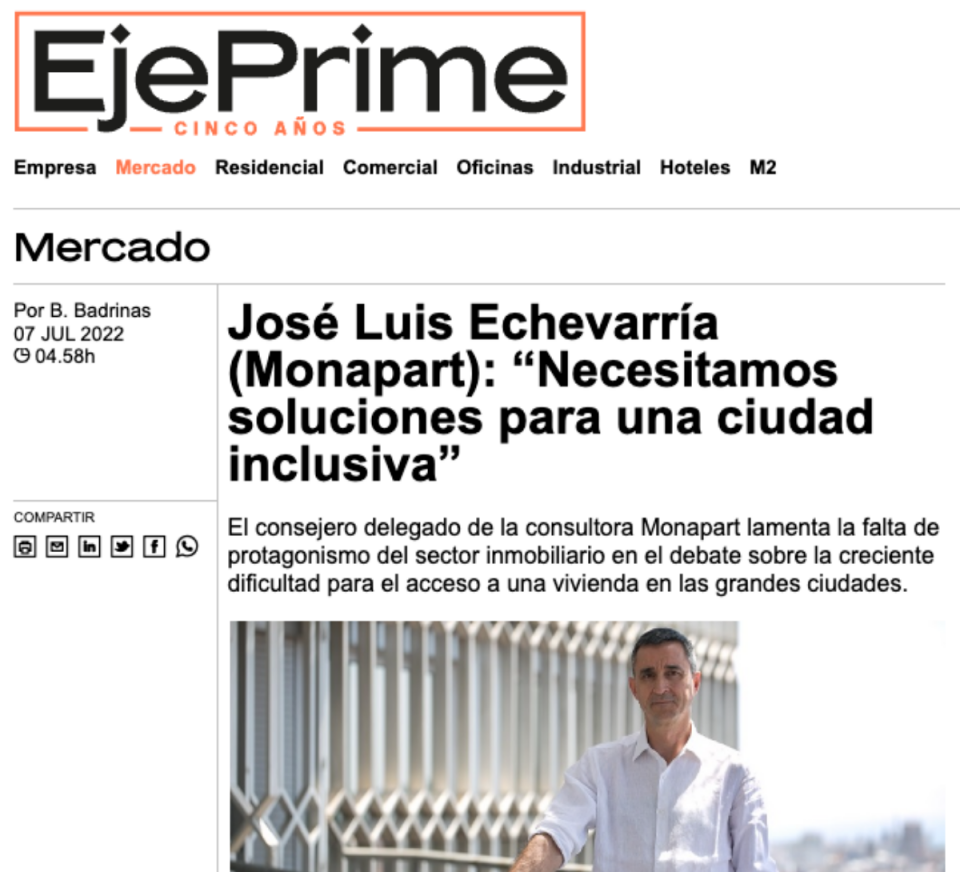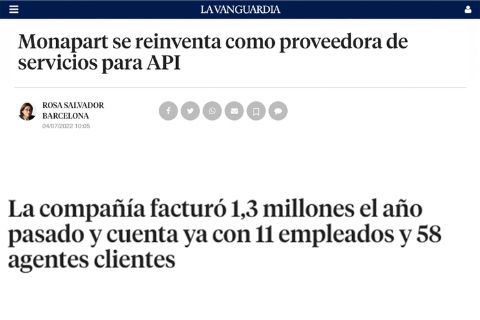EjePrime talks about the real estate agents of the future
EjePrime, the economic information newspaper for the real estate sector, interviews José Luis Echeverría and shows what the real estate agent of the future should be like.

José Luis Echeverría is CEO of Monapart, a real estate consultancy aimed at providing services to real estate agents throughout Spain in order to improve their business. He believes that the residential sector will enter a period of moderation, both in terms of sales and prices, in the coming years and is committed to a debate on access to housing in which real estate will play a greater role. Or do we want cities where middle class people cannot live and only an international elite working in 22@ can live?asks Echeverría.
How do you see the residential sector at the moment?
We are on the way to stabilisation because, after reaching a record in prices and sales, the next few years are going to be more boring, which is not a bad thing. Whatever happens in the big cities or markets, everything is going to moderate. In fact, nowadays, purchases are already frictional, with much slower negotiations. In transactions, the buyer does not have the feeling that he or she is in a moment of opportunity.
Are the major trends that emerged with the pandemic consolidating?
Well, it is clear that houses with exteriors have increased in value and that has remained there. But, beyond this, I think that the impetus of people wanting to move out of the big cities has been revived. When the big confinements have been forgotten, the value of city centres, which is where things happen, has returned. In terms of demand, it's back to business as usual.
"The centre of the big cities has been revitalised when the confinements have been forgotten".
But also rental, multifamily products and other new products have emerged strongly...
Rental demand is changing in the big cities, where foreign professionals with greater purchasing power are arriving and are interested in quality product, hence the boom in build-to-rent developments. Moreover, in Barcelona, unlike other cities, regulatory changes have led to an increase in the supply of homes for sale, which is strangling rental. Agencies, for example, receive an average of 120 calls of interest for each flat they receive for rent.
What do you think of Barcelona City Council's housing policies?
I feel a certain ambivalence, because I understand that the policies of the City Council are a wheelbarrow for real estate, but we are at a time when people in big cities have a difficult access to housing. I don't like the solutions that are being adopted, but I don't like the inaction either. We have to look for alternatives and I would like the real estate sector to come up with solutions for an inclusive city, or do we want cities where middle-class people can't live and only an international elite working in 22@ can live? The sector is absent from this debate and as it does not lead it, it seems to delegate it to other agents, such as the City Council.
Can you propose some ideas that would help in this debate and facilitate access to housing?
Businesses will have to learn to compete in an environment that is less favourable to their interests. If we were to look for a comparison with the past, it would be as if industrialised companies had not adapted to the eight-hour working day and we were still in the 19th century. This must also happen in our case, and that means making construction processes more efficient, thanks to an industrialisation that has to adjust costs. In general, we need to achieve a society where wealth is more widely distributed.
"The property agent that society demands is the one who is able to change a hitherto stressful experience into a rewarding one".
In general terms, what are the main deficits or shortcomings that real estate agents currently have?
Based on our experience, we find that agents often lack adequate professional skills. This is especially obvious among experienced agents, because their high knowledge of the real estate profession and sales contrasts with a deficit in generic professional skills, such as digital skills, languages, proper time management or the development of effective communication. In addition, we also see a lack of minimally regulated real estate training and, as self-employed agents, a lack of knowledge and business training.
With the transformation the industry is undergoing, what should the property agent of the future look like?
If I had to sum it up, I would say that the real estate agent that society is going to ask for is a professional capable of turning a hitherto stressful, opaque and often inefficient experience into the opposite: a rewarding and happy experience that takes place in a framework of security and trust. To achieve this, agents must stop thinking of themselves as necessary professionals (every day hundreds of private individuals sell their homes without the need for an agent) and start thinking of themselves as desirable professionals capable of optimising and adding value to the experience of buying, selling or renting a real estate asset.





